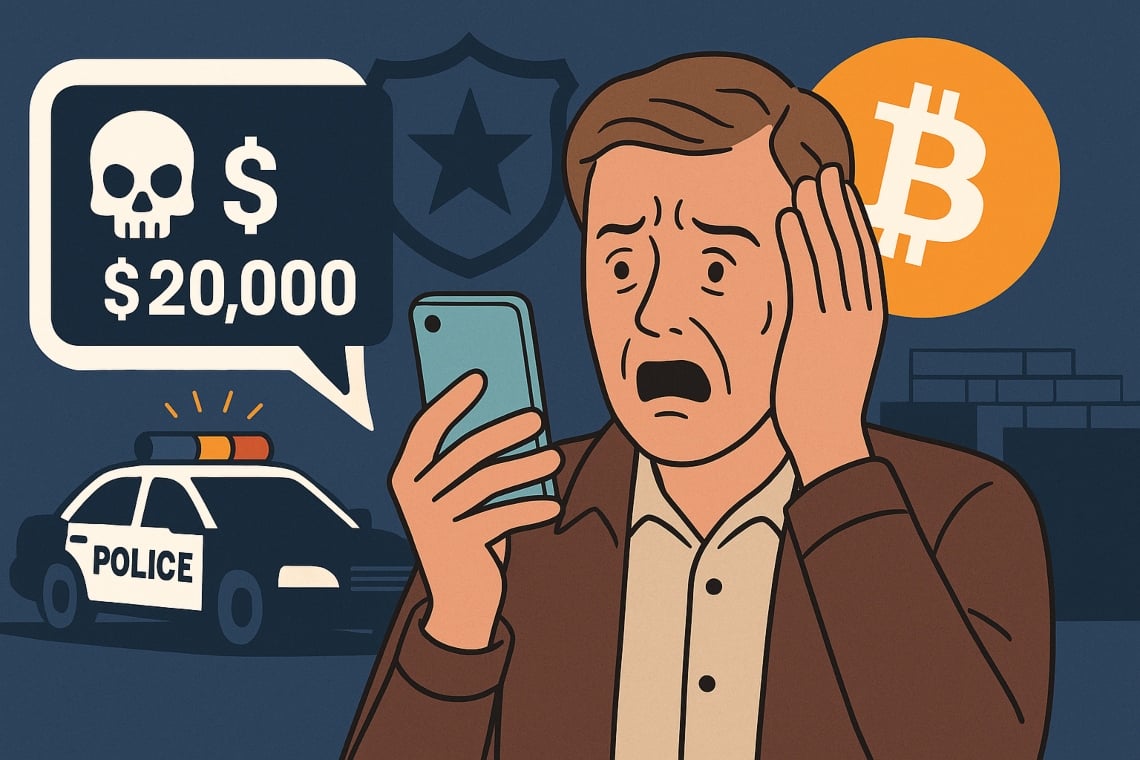The scams and frauds that use Bitcoin as a means of payment are becoming increasingly sophisticated and dangerous.
In Oconee County, South Carolina, a recent case involved a resident being threatened via text message with the extortion of $20,000 in Bitcoin, with the threat that a family member would be killed if the payment was not made.
This episode reflects a growing alarm related to digital fraud and underscores the importance of correct information to avoid falling into traps.
Scams news: the scam with threat of violence and request for Bitcoin
An individual from Oconee County received a text message in which a scammer demanded a payment of 20,000 dollars in Bitcoin.
The request was accompanied by a frightening threat: if the money was not sent, a family member of the victim would be killed.
This form of extortion exploits not only fear but also the difficulty of tracing funds transferred via cryptocurrencies like Bitcoin.
According to the Oconee County Sheriff’s Office, the victim also received a phone call, but did not answer it.
Important to highlight that no payment was made in Bitcoin, nor in other forms. In this way, the person avoided getting caught in the bull trap.
The police force has used this emblematic case to strengthen its awareness campaigns against fraud via messages and phone calls, urging the entire community to remain vigilant.
Corporal Jimmy Watt, public information officer of the sheriff’s office, emphasized the need not to respond to extortion messages that threaten physical harm to oneself or family members.
His key advice is clear: do not make any payments of any kind and immediately contact the authorities to report the extortion attempt.
Furthermore, Watt strongly recommends keeping all received communications, including message conversations or missed calls.
This material can prove crucial for the investigations, because the investigators can use it to identify the suspects and bring the culprits to justice.
Another scam: false requests for gardening services
In addition to the blackmail via Bitcoin, the sheriff’s office has reported another type of scam that has emerged in the area. These are fraudulent proposals concerning lawn care services for houses on sale.
A potential client received a quote for garden maintenance work and signed a fake contract. The victim sent a check that was cashed regularly, making them believe in the legitimacy of the operation.
Subsequently, he was asked to send 1,000 dollars for a fictitious “letter of authorization.”
After sending another check, the victim was urged to make a payment via Zelle – a platform for electronic money transfer – while the second check was still undergoing bank verification.
Fortunately, the victim refused to send the payment via Zelle. Investigators then discovered that the communication came from a non-professional Gmail address and was characterized by a tone that was not serious and unclear.
Further requests for payments via Apple Pay and Visa reloadable cards have further alerted the operators.
As explained by Corporal Watt, a clear indication of a scam is the request for payments with unusual or hard-to-track methods, such as gift cards or instant payment apps.
The rapid spread of Bitcoin as a financial asset has opened up new possibilities, but also new threats for less experienced citizens. Scams involving cryptocurrencies or digital payment methods are becoming increasingly common and aggressive.
Practical advice to avoid falling into traps
1. Never make payments on urgent or threatening requests, especially using Bitcoin or other methods that are difficult to trace.
2. Ignore suspicious messages or phone calls and do not respond to common fear tactics.
3. Preserve all communications, including messages, emails, conversation screenshots, and numbers from which you are contacted.
4. Contact the local authority immediately to report any incident that raises suspicions, in order to contribute to the investigations.
5. Always ask for an opinion from trusted people before finalizing agreements or payments to unknown parties or new suppliers.
For example, in case of the need for services such as lawn care, Watt urges consulting friends or relatives for reliable advice, avoiding contact with unverified companies or people, especially if they approach in an unprofessional manner.
The emerging scams in South Carolina highlight a growing need for digital education and collective vigilance. Crime exploits technology and the anonymity of digital payments, including Bitcoin, to strike more effectively.
As a result, information campaigns and dialogue between citizens and law enforcement become essential to curb the phenomenon.
Everyone must recognize the signals and understand that, when faced with threats or suspicious requests, the best defense is caution and immediate reporting.
